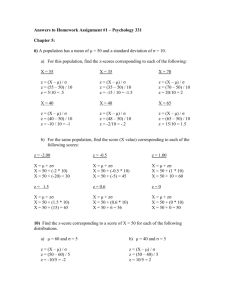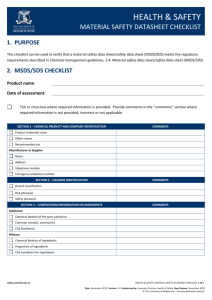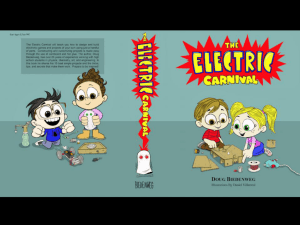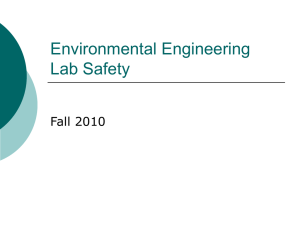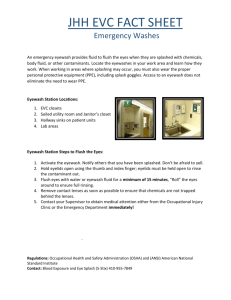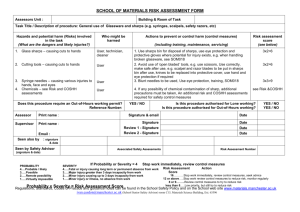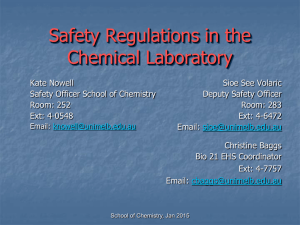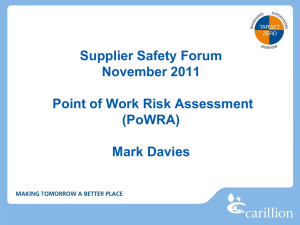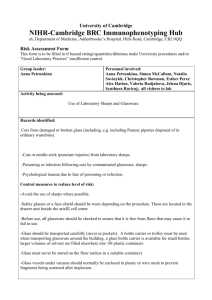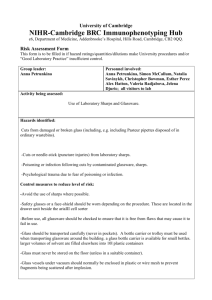First aid assessment: laboratory area - Safety
advertisement
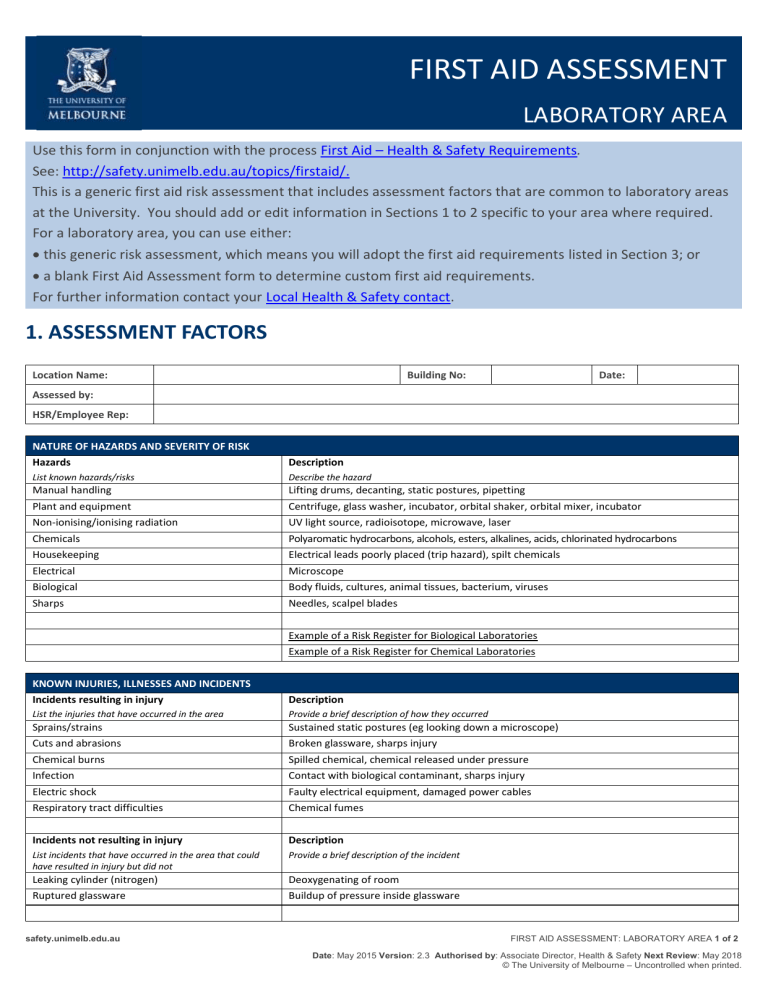
FIRST AID ASSESSMENT LABORATORY AREA Use this form in conjunction with the process First Aid – Health & Safety Requirements. See: http://safety.unimelb.edu.au/topics/firstaid/. This is a generic first aid risk assessment that includes assessment factors that are common to laboratory areas at the University. You should add or edit information in Sections 1 to 2 specific to your area where required. For a laboratory area, you can use either: this generic risk assessment, which means you will adopt the first aid requirements listed in Section 3; or a blank First Aid Assessment form to determine custom first aid requirements. For further information contact your Local Health & Safety contact. 1. ASSESSMENT FACTORS Location Name: Building No: Date: Assessed by: HSR/Employee Rep: NATURE OF HAZARDS AND SEVERITY OF RISK Hazards Description List known hazards/risks Describe the hazard Manual handling Lifting drums, decanting, static postures, pipetting Plant and equipment Centrifuge, glass washer, incubator, orbital shaker, orbital mixer, incubator Non-ionising/ionising radiation UV light source, radioisotope, microwave, laser Chemicals Polyaromatic hydrocarbons, alcohols, esters, alkalines, acids, chlorinated hydrocarbons Housekeeping Electrical leads poorly placed (trip hazard), spilt chemicals Electrical Microscope Biological Body fluids, cultures, animal tissues, bacterium, viruses Sharps Needles, scalpel blades Example of a Risk Register for Biological Laboratories Example of a Risk Register for Chemical Laboratories KNOWN INJURIES, ILLNESSES AND INCIDENTS Incidents resulting in injury Description List the injuries that have occurred in the area Provide a brief description of how they occurred Sprains/strains Sustained static postures (eg looking down a microscope) Cuts and abrasions Broken glassware, sharps injury Chemical burns Spilled chemical, chemical released under pressure Infection Contact with biological contaminant, sharps injury Electric shock Faulty electrical equipment, damaged power cables Respiratory tract difficulties Chemical fumes Incidents not resulting in injury Description List incidents that have occurred in the area that could have resulted in injury but did not Provide a brief description of the incident Leaking cylinder (nitrogen) Deoxygenating of room Ruptured glassware Buildup of pressure inside glassware safety.unimelb.edu.au FIRST AID ASSESSMENT: LABORATORY AREA 1 of 2 Date: May 2015 Version: 2.3 Authorised by: Associate Director, Health & Safety Next Review: May 2018 © The University of Melbourne – Uncontrolled when printed. LOCATION, SIZE AND LAYOUT OF THE WORKPLACE Item Detail Provide details Maximum distance to first aid kit Number of floors Access between floors Nearest hospital Nearest doctor/medical service Nearest emergency shower/eyewash NUMBER AND DISTRIBUTION OF STAFF Item Detail Provide details Number of staff Primary working hours Overtime worked Staff working in isolation Other 2. OUTCOME OF ASSESSMENT OUTCOME Item Description Briefly provide a description based on the information obtained from the assessment People exposed Injuries/adverse outcomes that may occur Risk controls Risk assessments, signage, information & training, supervision, restricted access, MSDS/SDS, emergency shower/eyewash Level of Risk High risk work location Other 3. FIRST AID FACILITIES REQUIRED FACILITIES Facilities/Resources Detail Provide details of the required facilities/resources Number of first aiders 1 first aider per 25 staff 2 first aiders per 26 – 50 staff 1 additional first aider for every additional 50 staff Competencies of first aiders Provide First Aid (HLTAID003) Number and location of first aid kits 1 kit per 25 staff 2 kits for 26 – 50 staff up to 200 staff 1 additional kit for every 50 staff above 50 staff Contents of first aid kits Basic First Aid Kit Contents First requirements for specific hazards – refer to MSDS/SDS Additional/specialist first aid equipment Oxygen therapy (where applicable) Emergency shower/eyewash Required where corrosive chemicals are in use and/or stated on the MSDS/SDS First aid room For more than 100 staff a first aid room is required Provision of first aid information in languages other than English Nil – English competency required for all staff and students who do not have English as a first language Other safety.unimelb.edu.au FIRST AID ASSESSMENT: LABORATORY AREA 2 of 2 Date: May 2015 Version: 2.3 Authorised by: Associate Director, Health & Safety Next Review: May 2018 © The University of Melbourne – Uncontrolled when printed.
